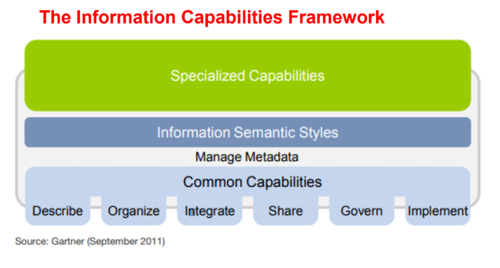Difference between revisions of "Information Capabilities Framework (ICF)"
| Line 1: | Line 1: | ||
| − | The '''Gartner Information Capabilities Framework (ICF)''' describes an approach and guidelines for architecting a modern information infrastructure. | + | The '''Gartner Information Capabilities Framework (ICF)''' describes an approach and guidelines for architecting a modern information infrastructure. [https://www.gartner.com/en/information-technology/glossary/information-capabilities-framework Gartner defines ICF] "as the collection of capabilities required to create business value from information assets. The ICF is a conceptual model developed to help IT leaders think holistically about the capabilities that they need to create value from enterprise information assets. It does not pre-suppose a particular use case or information source and does not rely on or advocate any particular technology or architectural style. |
| + | |||
| + | The ICF is a conceptual framework and doesn't imply or require a specific architectural approach, implementation tactics, or tools, or technologies. It does, however, recognize that the capabilities described within are interdependent and that extreme data challenges require a more holistic | ||
| + | approach than has been traditionally practiced. But it's not only for extreme information challenges. Any organization would benefit from this, even if they have no dimensions of "extreme." Just evolving existing capabilities in a consistent, application-independent manner has huge value. It | ||
| + | enables the organization to treat information as a strategic asset, equal in importance to applications and business processes. | ||
| + | |||
| + | Typically, capabilities required for information management were developed independently by project, application, or information type. This approach has led to fragmented, disjointed silos of information that are not easily joined together and cannot readily support new information types and | ||
| + | use cases. It also has generated siloed approaches to managing information — each application or project taking its own approaches to the "verbs" in the platform. This creates redundancies (higher cost), inconsistencies (higher risk and cost), complexity (lack of agility), and lack of transparency | ||
| + | (impossible to know how the data is really being managed). To meet the new information challenges described above, a new approach is required: the information capabilities framework.<ref>What is the Gartner Information Capabilities Framework (ICF)? [https://www.gartner.com/en/information-technology/glossary/information-capabilities-framework]</ref> | ||
| + | |||
| + | |||
| + | [[File:The Information Capabilities Framework.png|500px|The Information Capabilities Framework]] | ||
Revision as of 14:43, 19 September 2022
The Gartner Information Capabilities Framework (ICF) describes an approach and guidelines for architecting a modern information infrastructure. Gartner defines ICF "as the collection of capabilities required to create business value from information assets. The ICF is a conceptual model developed to help IT leaders think holistically about the capabilities that they need to create value from enterprise information assets. It does not pre-suppose a particular use case or information source and does not rely on or advocate any particular technology or architectural style.
The ICF is a conceptual framework and doesn't imply or require a specific architectural approach, implementation tactics, or tools, or technologies. It does, however, recognize that the capabilities described within are interdependent and that extreme data challenges require a more holistic approach than has been traditionally practiced. But it's not only for extreme information challenges. Any organization would benefit from this, even if they have no dimensions of "extreme." Just evolving existing capabilities in a consistent, application-independent manner has huge value. It enables the organization to treat information as a strategic asset, equal in importance to applications and business processes.
Typically, capabilities required for information management were developed independently by project, application, or information type. This approach has led to fragmented, disjointed silos of information that are not easily joined together and cannot readily support new information types and use cases. It also has generated siloed approaches to managing information — each application or project taking its own approaches to the "verbs" in the platform. This creates redundancies (higher cost), inconsistencies (higher risk and cost), complexity (lack of agility), and lack of transparency (impossible to know how the data is really being managed). To meet the new information challenges described above, a new approach is required: the information capabilities framework.[1]

